23 Jul 2014
How To Stage An Intervention
Helping someone you love admit to having an addiction and agree to get help is a big challenge. It can be tempting to lecture, nag, and even beg your loved one to get help, but sometimes what it really takes is a focused confrontation. When it seems like your loved one will never let go of denial or agree to get help, consider a group intervention. Before you throw one together, make sure you understand what it means to host an intervention, learn how to optimize the chance of success and consider what to do if it fails.
What Is An Intervention?
 An intervention is a planned meeting during which you and other loved ones confront someone who is struggling with addiction. While interventions have traditionally involved asking the addict to sit and be quiet while others talk, more recently they have become more like conversations. The more modern approach allows the addict to bring up his concerns and to ask questions in a safe environment. The idea is to not blame or shame the addict, but to make sure he understands how many people care about him, are worried about him and want to help.
An intervention is a planned meeting during which you and other loved ones confront someone who is struggling with addiction. While interventions have traditionally involved asking the addict to sit and be quiet while others talk, more recently they have become more like conversations. The more modern approach allows the addict to bring up his concerns and to ask questions in a safe environment. The idea is to not blame or shame the addict, but to make sure he understands how many people care about him, are worried about him and want to help.
An intervention typically includes a planned approach, specific examples for the addict regarding his behaviors and their consequences, and a statement from all of the participants regarding what they will do if he continues to refuse help. Participants may include family members, friends, coworkers and sometimes an addiction professional.
What Makes An Intervention Successful?
You can never guarantee that your intervention will be successful (success is measured by the willingness of the addict to accept and get help), but you can ensure the best odds of success by carefully preparing for the event. An intervention should start with thorough planning that includes participants, deciding what each person will say and even having an outline for how the event will proceed. Practicing ahead of time is also a good idea, as is asking each person to write down what he or she wants to say.
A good intervention should also include specific consequences. For instance, you might tell the addict that you are cutting off financial support if he refuses to get help. Each person participating should be ready with a consequence to help motivate the addict to accept treatment. It is also important to select the timing of the intervention carefully. It would be best if your loved one is sober, so choose a time and day that this is most likely to be the case. And finally, be ready with treatment options.
When To Rely On A Professional Interventionist
There are addiction professionals who specialize in planning and hosting interventions and if you feel that you cannot handle holding one on your own, consider consulting with one of these specialists. There are other good reasons to turn to a seasoned interventionist professional: if your loved one has a serious mental illness, has a history of violence, cannot be counted on to be sober for the event or if he shows signs of suicidal behaviors or attitudes. In these cases, confronting your loved one may be beyond your abilities.
When An Intervention Plan Doesn’t Work
As you prepare for the intervention, be ready for the possibility that your loved one will continue to deny his problem and refuse to get treatment. Make sure that everyone involved is prepared to follow through with the consequences that you are setting for him. If it means cutting this person out of your life because of the harm he is causing you, be ready to do it. Remember that you cannot control his choices or his behaviors. You can offer him all the help in the world, but only he can accept it.
If You Need More Help With An Intervention Plan, Call Us Now! Help Is Available 24/7
07 Jul 2014
Are Binge Drinkers Addicted To Alcohol?
Binge drinking is a term used to describe heavy drinking. According to the National Institute on Alcohol Abuse and Alcoholism (NIAAA), binge drinking means having enough drinks in a two hour period to achieve a blood alcohol concentration level of 0.08, a level at which a person is considered to be intoxicated. Binge drinking is increasingly common, but does it make a person an alcoholic or addicted to alcohol? The answer is not so simple.
The Risks Of Binge Drinking
For women, binge drinking typically means having four or more drinks in a two-hour period. For men, it means having five or more drinks. Consuming this much alcohol in one sitting, or more, is detrimental to your health. And if you drink this way, you are not alone. One in every six adults in the U.S. binges four times a month. Each binge includes eight drinks on average. This is a lot of alcohol.
Binge drinking can lead to a number of health problems, not least of which is dependence on alcohol, or alcoholism. It can also cause:
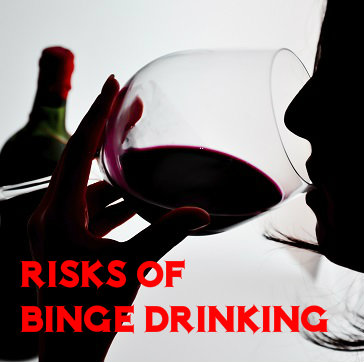 liver disease
liver disease- high blood pressure
- heart attack
- stroke
- neurological damage
- complications if you have diabetes
Binge drinking also leads to:
- accidents and injuries
- alcohol poisoning
- fetal alcohol syndrome
- unintended pregnancies
- problems with relationships
- strain on career and finances
What Is Alcoholism?
So does binge drinking make you an alcoholic? Not necessarily. Addictive disorders are most often diagnosed based on the Diagnostic and Statistical Manual of Mental Disorders. The fifth version of this manual recently came out with new criteria for alcohol addiction. The fourth edition listed alcohol abuse and alcohol dependence (alcoholism) as two separate disorders. The fifth edition merged the two into one disorder: alcohol use disorder. A person can be diagnosed as having a mild, moderate or severe case of alcohol use disorder.
According to the fifth edition, to have an alcohol use disorder you must have two of the eleven symptoms listed in the manual. Having two or three symptoms represents a mild case. Binge drinking is not listed as a symptom, but several of the symptoms could result from binge drinking. For instance, one symptom is drinking more than you intended to on a particular occasion. Many binge drinkers could claim doing this. Another symptom is trying to drink less, but failing. Again, this can happen with binge drinking.
There are several other symptoms that could go hand-in-hand with binge drinking. This means that if you binge drink and end up having two of these symptoms, you could be diagnosed as having mild alcohol use disorder. If the risks of binge drinking are not enough to make you want to slow down, maybe this fact is.
Stopping Binge Drinking
Moderate drinking is not harmful to your health, unless you have specific conditions that are exacerbated by alcohol. If you binge drink regularly, consider cutting back to moderate drinking levels. If you don’t, you put yourself at risk for a number of health problems. Not least of these is alcohol use disorder. If you could qualify for a diagnosis of mild now, you are on the path to having moderate or severe alcohol use disorder later.
Being a moderate drinker means having no more than three drinks per day and seven per week if you are a woman. If you are a man, have no more than four drinks per day and 14 in a week. Cutting back is important for your health, but if you find you can’t, you may need to get help. Rely on friends and family to support you in drinking less, or find a support group to join. You don’t need to be a full-blown alcoholic to ask for help. Doing so now could save you disastrous consequences in the future.
If You Or Someone You Love Needs Help Quitting Drinking – Call Us Now – We Will Get You On The Path To Happy And Healthy Sobriety!
30 Jun 2014
Does Addiction Need To Lead To Divorce?
Addiction can wreak complete havoc on a marriage. The addict partner may neglect or even abuse his or her spouse, drain the family’s finances, and be completely unavailable to any family member. The resulting feelings in the non-addicted spouse often include depression, resentment, anger, and even outright hatred. It seems inevitable that these marriages are headed for divorce, but when both partners make a commitment to work through the issues, that outcome can be avoided.
How Can The Addict Turn Things Around?
 If you are the addict and you want to save your life and your marriage, the first and most important thing you can do is to get treatment for your addiction. Commit to your treatment plan and work hard to get sober and stay sober. This step is a powerful statement to your spouse about your intentions. Actions always speak louder than words; if you have promised your spouse again and again that you would get help but didn’t follow through, only action will save you now.
If you are the addict and you want to save your life and your marriage, the first and most important thing you can do is to get treatment for your addiction. Commit to your treatment plan and work hard to get sober and stay sober. This step is a powerful statement to your spouse about your intentions. Actions always speak louder than words; if you have promised your spouse again and again that you would get help but didn’t follow through, only action will save you now.
In spite of making the move to get help and make things better, some marriages fall apart once the addicted spouse enters recovery. Seeking addiction treatment means more time that you need to focus on yourself and your recovery to the neglect of others. As you go into rehab, talk to your spouse and explain that you will need to be self-involved for a little bit longer, and that it is necessary in order for you to get well again. Ask for patience and time. Involving your spouse in the process to some extent can be helpful for your marriage. Consider including some therapy sessions with the both of you so you can start working on rebuilding your relationship as you learn to be sober.
How Can A Spouse Forgive?
If you are the non-addict, forgiveness and repairing your relationship with your spouse may seem impossible. You have been hurt and ignored, time and time again, but as long as your spouse is seeking treatment, there is hope. Start on the path to forgiveness by learning more about addiction. The more you understand the disease, the more likely you will be to develop some compassion for your spouse.
It may also be helpful for you to seek some counseling. See a therapist who specializes in helping people who have been hurt by addicts. Also consider joining a support group for the loved ones of addicts. You can learn a lot from the experiences of others who have been in your position. The support and camaraderie can also be a powerful tool for healing. Once you have taken the time to work on yourself, be prepared to forgive and to get involved in your spouse’s treatment. Your marriage cannot move forward if you still harbor grudges and resentments.
What if Divorce Is The Best Option?
Despite your best efforts your marriage may be headed for failure. How do you know if divorce is your best option? If you are the recovering addict, no matter how much you try, your spouse may not be able to forgive you or get past the damage you have caused. If you are the injured party, you may try everything to get your spouse to stay clean, but you see failure again and again. If you can’t live with your spouse anymore, you may need to follow through with a divorce. Even if you do split up, keeping up with therapy for both spouses is crucial. You have both been damaged and you both need healing, no matter what happens to your marriage.
If You Or Your Spouse Is Struggling With An Addiction – Call Us Now – We Are Here To Help!
Continued From – In A Relationship With An Addict: Stay Or Leave? Part 1
Addressing Codependency Within Yourself
If, through Al-Anon or CODA, you have identified codependent tendencies, it is time to seek help for that problem specifically. A relationship with an addict is never healthy, but neither is a relationship with a codependent. Codependency is a pattern that mimics addiction. If you hope to have healthy, functional relationships in the future, it is imperative that you begin working through this condition.
Ending a cycle of co-dependency is not easy and professional help may be required, as these patterns are usually deeply ingrained and rooted in childhood experience. Learning new, healthy patterns for relationships is not automatic and needs to be addressed intentionally.
Learning To Recognize The Deception And Manipulation Of Your Addict Partner
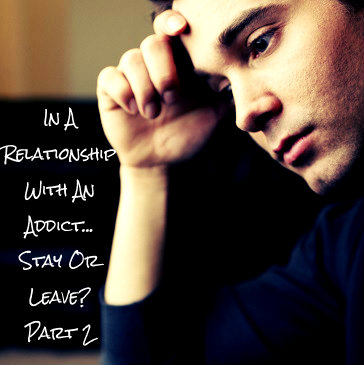 How many times has your addict partner blamed you for his or her problems? Or, when you confronted your partner about the addiction, the focus was shifted to you, claiming that if only you were more this or less that, the addicts wouldn’t drink or use in this way? What about all of the excuses of an addict?
How many times has your addict partner blamed you for his or her problems? Or, when you confronted your partner about the addiction, the focus was shifted to you, claiming that if only you were more this or less that, the addicts wouldn’t drink or use in this way? What about all of the excuses of an addict?
Your partner’s addiction is, in no way, related to you or your perceived failings as a partner. Addicts are masters of deception, blame-shifting, excuse-making, and manipulation. Are you falling for it? Do you believe the addict even when you suspect he or she is lying? Do you fail to acknowledge red flags? Part of codependency is smoothing over issues or matters that may cause a fight but should be addressed. Are you allowing yourself to be manipulated?
Recovery May Not Be The Answer For The Relationship
As the non-addict partner, your focus has been on the addict—their needs, their issues, their failings, their protection, and their need to get into recovery. And sometimes the addict does actually pursue recovery, get sober, and join a 12-step community. It seems like this would be the ideal situation.
Not necessarily. Indeed, recovery is always the answer for the addict. There is never a time when it is better to stay in addiction than to get into recovery. But recovery may not be the “answer” for your relationship. The combination of an addict (them) and a non-addict/potentially co-dependent (you) creates a certain relational pattern that, while perhaps not ideal, is familiar. The addict is accustomed to being the screw-up or the authoritarian, and the non-addict is slotted into the role of caregiver, protector and hero.
Recovery changes that. Suddenly the sober addict is bringing a new dynamic to the relationship—taking ownership of their faults, attempting to set proper boundaries, devoting time to recovery and a 12-step community, and seeking the direction of a higher power. This can leave the non-addict in a quandary, not knowing how to act or respond to the sober partner, and not appreciating the shift in roles. Co-dependents get their fix from being rescuers, enablers and controllers. When they are relieved of that role, conflict often results.
Breaking Up With An Addict
A relationship with an addict can never be anything less than toxic. If you are dating rather than married to an addict, the ease with which you can leave the relationship is greater. In the case of marriage where children and a shared home may be involved, other tactics and attempts at recovery should be employed before declaring the marriage over.
For those who are in a dating relationship, the ties with an addict are somewhat easier to sever. While a breakup is always painful, you won’t have the added challenge of a legal battle. The hassle of splitting up possessions or finding a new place to live should not be a deterrent. Freedom and healing is worth that price.
If you fear that your attempts to leave the relationship will be met with violence or other maliciousness, it is wise to involve law enforcement, obtaining a restraining order if necessary. It is also helpful to have the names and phone numbers of shelters in your area where you could stay anonymously for a period of time if necessary.
Listening To Wisdom Of Others And Making A Healthy Decision For Yourself
While the opinions and advice of others need not dictate your life and the decisions you make regarding your relationship, it is often wise to listen to people around you. If your family and close friends are consistently encouraging you to send your partner packing, you may want to take heed. Think they don’t know him like you do, or that they just can’t see the real her? You may be right, but at some point you may need to ask yourself if you are the one who is not seeing the situation in all of its reality.
Whether you decide to stay or leave, you are seeing that not all problems in your relationship are the addict’s. You are gaining awareness of your own faults and perhaps your unrealistic expectations. Only you can decide if this relationship is right for you, but you are gaining the knowledge and understanding to help you make an informed and healthy decision.
Read More About How To Handle A Loved One With An Addiction
You know your partner battles an addiction and you’ve seen the toll it is taking on your relationship, not to mention your own well-being and sanity. Yet you stay. And the problem continues. How do you recognize an addict’s excuses? Is it possible to have a healthy relationship with an addict? Should you even try? How do you decide when it’s time to call it quits?
Unhealthy Attracts Unhealthy In Relationships
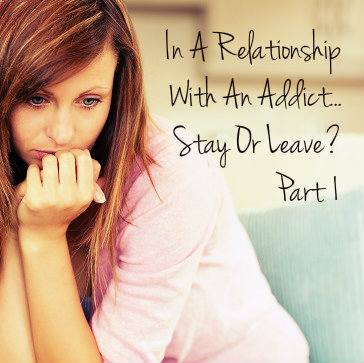 It helps to begin with a little soul searching. What keeps you in a relationship with an addict in the first place? The reality is that people who maintain relationships with addicts are often operating from a place of co-dependency and emotional neediness. Whether or not you stay in the relationship, it is probably time to start looking at some of your own issues.
It helps to begin with a little soul searching. What keeps you in a relationship with an addict in the first place? The reality is that people who maintain relationships with addicts are often operating from a place of co-dependency and emotional neediness. Whether or not you stay in the relationship, it is probably time to start looking at some of your own issues.
It is easy to make the relationship about the other person and his or her addiction and to be constantly focused on catering to the needs of the one who seems to be the “problem.” As a result, the non-addict doesn’t see the need to work on him or herself. In normal relationships, each partner is growing and changing in partnership with the other. In the case of a relationship with an addict, however, this normal growth and progression stagnates—often for both partners.
Examine Your Motives When In A Relationship With An Addict
People in relationships with addicts often avoid trying to honestly discover why they are in the relationship in the first place. No one can tell you it is time to end the relationship, but you might ask yourself why you think you want, or need, to stay.
Questions To Help You Work Through The Feelings Of Continuing Or Ending The Relationship With An Addict
- Are you afraid of being alone?
- Are you afraid you can’t find anyone better than your current partner?
- Do you believe that you can change him/her?
- Do you think you can love him/her out of the addiction and into a clean life?
- Do you optimistically believe that somehow things will just work out, even though there had been no evidence of that?
- Do you tell yourself it’s not that bad?
- Are you afraid of drastic consequences if you leave the addict? Has he or she threatened harm to self, you, or others if you end the relationship?
- Are you avoiding the hassle? Are you too lazy to make the break and deal with the consequences of splitting possessions and potentially having to find another place to live?
- Are you afraid to discuss the problems in your relationship or your desire to leave for fear of starting a fight? Are you afraid of physical abuse?
- Is the addict working to convince you there isn’t a problem, but maybe your gut is telling you differently?
- Has the addict vowed to go to AA, but failed to follow through?
- Do you think the addict can’t make it on his own without you?
- Are you afraid to present an ultimatum?
More “yes” answers than “no” suggest strong co-dependent tendencies.
Work On You And Your Own Issues
Any time spent in a relationship with an addict can be crazy-making. It is time to start working on you. Seeking your own recovery can often help you to better decide whether you should try to keep the relationship going or end it.
Start by attending an Al-Anon meeting in your area. Al-Anon can help you to better understand addictive patterns and tendencies and give you the tools and support for working with them. You will learn about yourself, and why you stay with an addict, and how to set better boundaries if you do stay in the relationship.
Co-Dependents Anonymous (CODA) is another group worth seeking out. Partners of addicts commonly suffer from codependent tendencies. A group like CODA takes the focus off of healing the addict and puts it onto healing and discovering you.
Whether or not you choose to stay with the addict, and whether or not he or she will get help, you need help and support in dealing with the addiction, and eventually healing from it.
People who have been brainwashed by a relationship with an addict often repeat unhealthy relational patterns in subsequent relationships. Attending Al-Anon can help the non-addict partner learn the realities of addiction and co-dependence, and can be an eye-opening experience of personal growth and development.
Hitting Bottom In The Relationship
As you wait for the addict to hit bottom and reach his or her limits, you might think about your own limits. What does it mean for you to hit bottom in this dysfunctional relationship? Partners of addicts become accustomed to responding to the needs of the addict without considering their own personal needs and preferences. In order to be ready to leave the relationship, you will have to hit your own bottom—the place of complete despair and desperation. It is at this point that you will be ready for a change. Have you hit bottom in your relationship with the addict?
Continued In – In A Relationship With An Addict: Stay Or Leave? Part 2
03 Jan 2014
How To Recognize An Addict’s Excuses
Making excuses for the habit is a cornerstone of being and addict. Until an addict can accept that he has a problem, you can expect to hear every excuse under the sun for why he abuses drugs or alcohol. If you suspect that someone you know and love has a problem, recognizing the common excuses can help you identify an addict and potentially stage a safe and healthy intervention. There are many creative excuses, but here are some of the most popular:
Popular Excuses Of Drug Addicts
- I’m not hurting anyone but myself – This is a classic excuse. Why can’t you leave him alone and let him live his life? He’s not hurting anyone else. If it were only that simple, maybe you would stop nagging him. Unfortunately your friend or family member does not live in a bubble and he needs to realize his habit is hurting others.
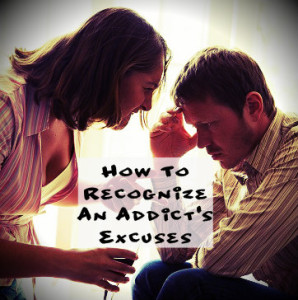 I need to use to be social – This is a common excuse used by introverts and the shy who have drug abuse problems. Drug or alcohol abuse should never be a crutch for socializing. In fact, it can make your friend look worse in social settings and can cause embarrassing situations.
I need to use to be social – This is a common excuse used by introverts and the shy who have drug abuse problems. Drug or alcohol abuse should never be a crutch for socializing. In fact, it can make your friend look worse in social settings and can cause embarrassing situations.
- I need to drink/use drugs to keep up at work – Using certain drugs can make a person feel high, powerful and energetic. Facing work and other responsibilities without the drug can seem daunting. Eventually, though, the drug abuse will catch up to him and make all responsibilities, at work and at home, more difficult.
- I only drink to relieve stress – And isn’t that how addiction begins? Drinking or using drugs is never a healthy way to cope with stress. The problems the habit causes will eventually create even more stress.
- I only use on the weekends/socially – There is no such thing as casual drug use. If your friend is getting high or drinking to pass out on Friday and Saturday nights, she still has a problem, and one that will only get worse.
- Everyone else does it – It may be true that you can look around a party and see people getting drunk, or even getting high, but you have no idea what their histories are. Comparing yourself to others is not a valid excuse to abuse drugs and alcohol.
- I can stop whenever I want to – As soon as someone utters this line, you can almost guarantee he has a problem. You should never have to convince others that you can quit whenever you want to. If you do, it means people are worried, and probably with good reason.
What You Can Do Once You Know The Addict’s Excuses
Being around someone who abuses drugs and alcohol or who is already a full-fledged addict means you are going to hear excuses. Learn to recognize them for what they are: pitiable reasons to continue using. When you know what to look and listen for, you can see addiction more clearly. Confront your friend or family member who is making these excuses and offer a solution: treatment.
Addiction is a disease, and like any physical disease, it requires treatment. Help your friend first recognize his problem by challenging his excuses. Then, be prepared to help him and to offer to get him into a treatment program. Doing it on his own will be a major challenge, but if you can be there to help him select a rehab program and to support him in his sobriety, he can succeed.
Read More On How Do I Know If I Am Enabling The Addict In My Life?
A recent study estimates that close to 10% of pregnant women drink alcohol. Given the potential harm that can come to a fetus when exposed to alcohol during development, and the fact that vast majority of females at child bearing age were probably taught this at some point in their lives, this number is truly upsetting. Unfortunately, it’s also not shocking.
Some people still think that alcoholism (or other forms of addiction) is a moral failing rather than a bona fide medical disorder. Sometimes the impulse to drink can be so great that an alcoholic will put the importance of a drink over the safety and well-being of loved ones. It happens all the time with parents of young children, even when there is overwhelming evidence that the parent is a good person and truly loves their kids. Who doesn’t know someone who grew up in an alcoholic household? Is there any reason to think that the simple fact of pregnancy would be able to reign in such a terrible disease?
Condemning Addicted Pregnant Women vs. Helping Them Abstain From Alcohol
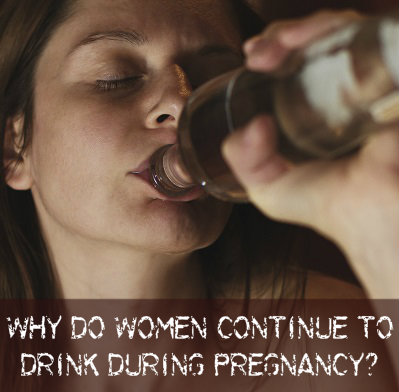 Instead of chastising and condemning pregnant women who drink, we should be devising ways to help them abstain from alcohol during gestation. For hard core alcoholics, it is entirely possible that the only way to stop them from drinking for close to a year would be to physically restrain them. Barring that, however, there are things that we can do to try to reduce the incidence of drinking while pregnant.
Instead of chastising and condemning pregnant women who drink, we should be devising ways to help them abstain from alcohol during gestation. For hard core alcoholics, it is entirely possible that the only way to stop them from drinking for close to a year would be to physically restrain them. Barring that, however, there are things that we can do to try to reduce the incidence of drinking while pregnant.
We, as a society, must be more proactive in teaching people about the risk of fetal alcohol syndrome, a complication that can happen if a mother drinks while pregnant. People born with fetal alcohol syndrome will likely have abnormal faces, growth issues, and problems in the central nervous system. These issues will not improve over time and the neurological impairments can lead to learning disabilities and behavioral issues, like attention deficit disorder. Fetal alcohol syndrome affects up to 3 million people in the US alone.
The problem with teaching about the dangers of fetal alcohol syndrome is that evidence is murky when it comes to determining how much alcohol can safely be consumed before a fetus is put at risk. It used to be, at least prior to the 1980‘s, that doctors never restricted women from drinking alcohol during pregnancy. However, at some point the medical establishment changed its tune and soon no amount of alcohol was permitted during pregnancy. Now, conflicting information can be found everywhere.
How Exactly Does Fetal Alcohol Syndrome Happen?
Babies do not inherit fetal alcohol syndrome. Instead, the ingested alcohol actually damages developing neurons and destroys brain cells. The damage can occur at any point in fetal development, even before the mother knows that she is pregnant. Once the cells have been compromised, there is presently no way to undo the damage.
Educate Teens On Abstaining From Alcohol If Having Sex
Without knowing exactly how much alcohol is safe for fetuses, the only safe option for pregnant women is to avoid drinking altogether. Since drug-related birth defects affect not only the child but society in general, more resources need to be expended to help keep pregnant alcoholics sober during gestation and continually remind women of all ages about the dangers of exposing themselves to toxic substances if there is a chance they could become pregnant. Since alcohol and sex many times go hand in hand, it is a responsible and appropriate discussion to have with kids, especially given how prevalent substance abuse is in some sub-teen populations.
Addiction During Pregnancy – All Of Our Concern
In addition to increasing the amount of materials available to women of child-bearing age regarding the dangers of drinking, medical professionals in all venues need to be more vigilant in identifying mothers who are actively drinking or are at risk of developing a drinking problem during pregnancy. Although alcohol rehab programs have begun offering specialized treatment programs for addicted mothers, the number of available beds is woefully inadequate to handle the sheer number of people requiring treatment. Hopefully governments will begin to see addiction during pregnancy as a public health crises and funnel adequate resources into handling the disease. If someone you know is drinking during pregnancy, encourage them to seek help.
Bipolar disorder is a mental illness that causes significant mood swings. It affects as much as two percent of the population and first manifests primarily in the late teens and early 20s. Although the severity and types of mood can vary dramatically among patients, the most common example of bipolar disorder is a cycling between periods of happiness and sadness, often at extreme levels (i.e. euphoria vs. despair). Although counseling can help patients learn how to identify their distinct moods, as well as the things that trigger each mood swing, many patients will also benefit from some sort of medication to help dampen negative symptoms and neutralize moods.
 It is now pretty obvious that people who are taking prescription medications, including bipolar medications, should refrain from drinking alcohol or using recreational drugs as these substances can negatively interfere with the proper functioning of the medication. In some cases, the prescriptions and other substances can negatively interact to the point of overdose or death.
It is now pretty obvious that people who are taking prescription medications, including bipolar medications, should refrain from drinking alcohol or using recreational drugs as these substances can negatively interfere with the proper functioning of the medication. In some cases, the prescriptions and other substances can negatively interact to the point of overdose or death.
The Importance Of Identifying Signs Of Substance Abuse In Bipolar Patients
Unfortunately, due to the nature of the disease, some bipolar patients are unable to refrain from using alcohol or drugs even when they are taking prescription medication for their illness. In fact, roughly half of all patients with some form of bipolar disorder also have a drug or alcohol problem. Thus, when treating a patient who has bipolar disorder, mental health professionals must be vigilant in identifying signs of substance abuse or alcoholism as the two illnesses tend to go hand in hand.
Scientists have yet to discover a definitive explanation for the high incidence of substance abuse among bipolar patients. In fact, the real explanation likely entails a combination of factors. For instance, genetics may play a pivotal role — a family history of substance abuse plus bipolar disorder increases a person’s risk of having both diseases. Further, bipolar disorder can be a tough illness to treat. Although certain medications have been shown to be successful in alleviating certain bipolar symptoms in many patients, there is currently no cure for the disease and no one magic medication that renders all patients symptom free. As such, many patients use drugs and alcohol as a way to escape the symptoms of or fallout from the disease. This phenomenon is known as “self-medicating” and is often found in patients with the more debilitating mental illnesses, including bipolar disorder.
It turns out that doctors must be especially vigilant when it comes to identifying substance abuse in female bipolar patients. Studies show that females suffering from bipolar disorder are several times more likely to abuse alcohol than men with bipolar disorder. Although men with bipolar disorder also have a higher incidence of alcoholism than men without bipolar disorder, the rate is nowhere near as high as with women.
Factors For Bipolar Disorder
While it could certainly be true that bipolar patients have a higher predisposition to addiction than non-patients, both family history and the fact that bipolar patients tend to self-medicate with drugs and alcohol is more likely the culprit behind such a high rate of alcoholism. Researchers at UCLA conducted a study of roughly two hundred and fifty bipolar patients who were being treated at UCLA on an outpatient basis. The results of the survey showed that the males with alcohol problems were more likely to have a history of alcoholism in their families than males without such alcohol problems.
However, female participants with alcohol problems did not report similar rates of family alcohol problems. Instead, these patients reported co-occurring issues with anxiety and depression. Thus, researchers hypothesized that women bipolar patients were more likely to self-medicate than their male counterparts. Unfortunately, research also suggests that women are less likely to seek help for drinking problems than men. This puts female bipolar patients at high risk not only for alcoholism, but for untreated alcoholism.
Read More About Addiction And Mental Health – There Is Hope!


